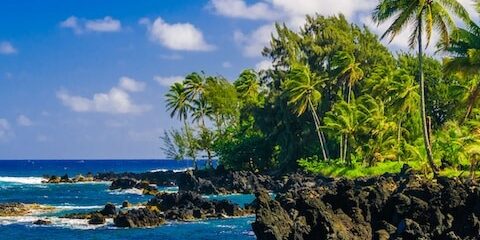There are long lists of things to do on Hana Maui to make your trip memorable. Yet, there are lists of DON’T that you should strictly not do on Maui for extra fun and enhanced safety.
1. Don’t just head out to sea on a stand-up paddle board. Unless you are an experienced surfer, making a spontaneous ocean trip to Tahiti on that little board is not safe. The stand-up paddle board is loaded with fun, but you need to get some training before hitting the ocean waves. You’ll love it more if you have the idea about doing it right. It is safe to hit the waves with a little instruction under your belt. Unawareness is not bliss when it comes to ocean games like SUP; it is rather dangerous.
2. Don’t throw opened food containers out. You’ll get to share the island paradise with masses of insects and other critters who bloom in Hana Maui’s tropical, warm climate. Rodents, spiders, ants, cockroaches, centipedes, they all live here, just as we do, and are a part of the island. Most visitor accommodations and homes regularly destroy their premises to control unwanted creatures’ interference in our vacation. But don’t lure them in by leaving any uncovered food in your room, car, or on your gallery. That leftover bowl of taro chips or a piece of pizza is a clear dinner bell for our creepy neighbors, yelling, “Come on in and get it!”
3. Don’t stand or sit under a coconut tree full of coconuts. One of the things you must avoid doing on Maui. One of those coconuts can suddenly fall and break your head or car, causing serious damage. Unfortunately, you won’t always see signs around to warn you, so always look out for what is flying over your head.
4. Don’t address residents as “Hawaiians.” Those who live in Hawaii address themselves as “locals.” A “Hawaiian” is actually a person who is of Native Hawaiian ethnicity. So, for example, you are a local in Maui. But you are not a Hawaiian. On the other hand, your husband is a local and Hawaiian too. And certainly, don’t refer to residents as “natives” because that will surely make the locals flinch.
5. Don’t honk. If you are On a Maui Road trip, avoid honking at other drivers unless you REALLY need to grab their attention. You might send a friendly “signal” to a friend passing by, but don’t honk at people except lives or cars are in imminent danger. Honking will surely get you some “angry eyes,” so don’t honk at drivers unless you want to grab their attention for some safety reasons.
6. Don’t smoke on the beach. With time beautiful Maui beaches had become an ashtray filled with thousands of cigarette butts. Smoking is now banned on most beaches of Maui. People have to pay a penalty of up to $500.
7. Don’t turn around. Pay attention to waves. An unexpected surf can hit you while returning from the water, or pausing for a while to adjust your flippers can hurt you or pull you into the sea. Keep your eyes on the ocean, so you are not caught unaware. It’s stronger than you are.
8. Don’t swim in cloudy waters. After heavy rains, stay away from the ocean till the water is clear. Avoid whirling near the mouths of rivers or in the murky or muddy water bodies. These waters attract hunters, and you don’t want to be the snack of any big predator.
9. Close all the doors and windows before leaving. Whether it’s your car or room. Road to Hana Maui is blessed with the best tropical weather that changes now and then. So, if you are visiting the grocery store on a bright sunny day, leaving your car windows down, you could come back 10 minutes later and see that there was rain while you were gone. Swimming in your back seat is the only option.
10. Don’t forget to try “local” food. Maui has Starbucks, Mcdonald’s, and Burger King. But why plan your vacation on this beautiful island and eat the same food you get at home? You get a huge variety of food like fish caught in the morning and on your plate at lunch, tropical vegetables and fruits fresh from the local farm, local fast-food restaurants, ethnic foods, food trucks, mom-and-pop cafes, and classy fine dining eateries with known chefs. Don’t feel afraid to try some local foods you’ve never eaten before!
11. Don’t scuba dive in the morning and head to the top of Mount Haleakala in the afternoon. If you love to swim, wait 24 hours after scuba diving, trekking up to Haleakala, or performing any other high-altitude activity, including a mountainside zip line or helicopter tour. Decompression illness is not what you want to take home from the Maui excursion.
12. Don’t skimp on the sunscreen; use ONLY reef-safe sunscreen. Keep applying the high-SPF sunscreen during the day when sightseeing on the island. As Maui is near the Equator, its tropical sun burns you faster, even when you are near the water or on a cloudy overcast day. Nothing will ruin your vacation than a sore sunburn! Nevertheless, if you want to go into the ocean, be mindful that many sunscreens include ingredients that can harm the coral reefs.
In January 2021, a new law was introduced in Hawaii that prohibits the distribution or sale of sunscreens containing oxybenzone that are harmful to the ocean’s ecosystems. Hawaii is the world’s first place to ban sunscreens with this chemical. If you have sunscreen that contains this chemical, do not use it on your tour to Road to Hana Maui. Instead, choose mineral-based sunscreens with zinc or titanium oxide, as they are reef-friendly products.
13. Don’t try to ride on the back of a green sea turtle or pet a Hawaiian monk seal. These two creatures are among many endangered and threatened kinds in the Hawaiian Islands, and they are kept safe from harassment or harm by very strict State and Federal laws. So, if you are lucky to see these wild beings, see them from a distance, but don’t touch them.” This must be on everyone’s top list of things you must strictly not do on Maui.
And, when it comes to ocean creatures, don’t feed the fish. It may charm you to feed a flurry of tropical fish while swimming, but remember, this is not a Disney movie. It is dangerous. First, it harms the fish and disturbs their natural ecological balance, even affecting the coral reefs, which depend on fish to keep them from being covered by algae. And often, fish become aggressive; you can lose your flesh or, even worse, some body part in this process.








